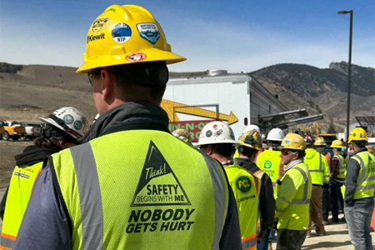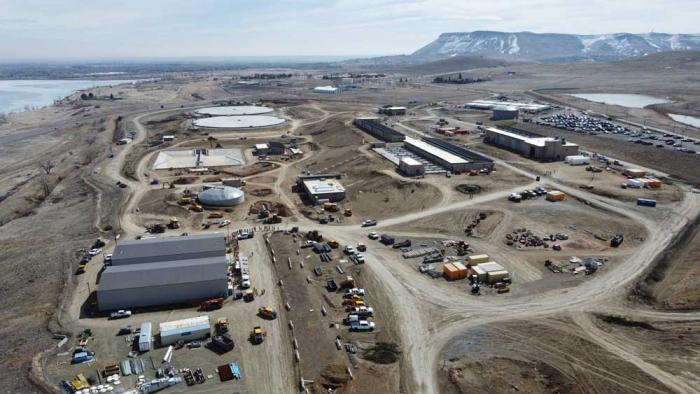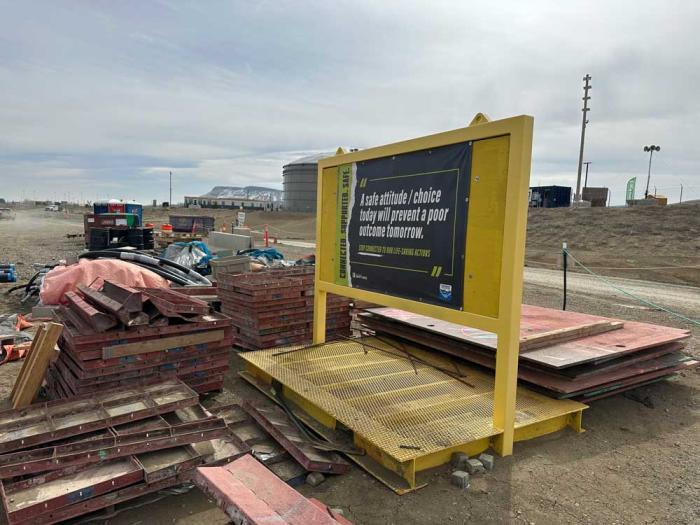A Milestone 2 Million Hours In The Making
By Steve Snyder

Denver Water’s Northwater Treatment Plant passes major safety milestone thanks to careful planning, engaged workers.
Two million dollars, 2 million beers, 2 million puppies — that’s all a lot, especially all at once. (By the way, these are ranked in order of personal preference.)
But 2 million labor hours safely worked on design and construction at a complex job site without an incident causing somebody to miss time? That calls for recognition and celebration.
And that’s what everybody involved with the construction of Denver Water’s Northwater Treatment Plant is doing — celebrating the milestone of 2 million hours safely worked on the project.
“For a project of this size and scope, it’s impressive,” said Pete McCormick, project manager for Denver Water’s new treatment plant. “It took so much planning and so many people working together to get to this point. We’re all proud to be a part of this.”
“It is a very unique project,” said Jesse Bowman, safety manager at Kiewit, the construction manager at risk for the project.
“For instance, we’ve had to work with many unique fall protection scenarios here that others may not have seen before. We have multiple organizations working together. We’ve had 100- to 300-plus craft people here at one time. We’ve had up to 60 pieces of heavy equipment on site at times, and we’ve done confined space work. It’s all an incredible challenge. And to do that all safely is truly impressive,” Bowman said.
Construction on the 183-acre site started in September 2018, and the new treatment plant will be operational in 2024.

Developing a safety culture during construction of the Northwater Treatment Plant, located north of Golden along Highway 93, was a top priority during project planning. Photo credit: Denver Water.
But with the project’s complex set of challenges, like those listed above, it was important to emphasize safety early in the planning phase.
The Northwater project team started the safety focus while creating the project’s charter.
During the process, the team placed safety as the project’s primary objective — above all other objectives. The project charter, which listed developing a zero-incident safety culture as the top objective, then became the guiding document for creating the project management and construction management plans.
This meant that from the moment the project broke ground until the time it is completed, safety would be, as stated in the charter: “paramount and will be the first priority of all parties to the project.”

One of the signs on the site of the Northwater Treatment Plant construction project touting the importance of safety. Photo credit: Denver Water.
“We set the expectations right away for everyone to follow,” said Nathan Worker, construction manager for Jacobs, the owner’s representative, on the treatment plant.
“This included empowering every person on site to speak up if they saw something concerning from a safety standpoint. It doesn’t matter if it’s your first day on the project of if you’ve been here the whole time. Every person can bring a safety concern forward.”
Other initiatives that contributed to this milestone include:
- Safety by design: During the design phase of the project, the project team hosted Continuous Improvement events during which current operators and maintenance crews identified accessibility constraints and problem areas at other Denver Water facilities. The point was to avoid such issues at the new treatment plant. Activities included creating a full-scale mock-up of a chemical storage and pumping room, as well as 3D model walk-throughs of each pipe gallery. Operators were able to visualize, access and sculpt the design, thus ensuring the finished product would be built with safety and accessibility standards influenced by the people who will eventually operate the plant.
- Craft voice in safety: This initiative, called CVIS for short, provided a platform to ensure all craft workers have an equal voice in safety, are working in partnership with management to take a proactive approach on relationship building, and are empowering other workers to support safety through prevention, education and awareness efforts. The CVIS team continues to meet weekly with the dedicated site safety engineer and the on-site project safety manager to discuss safety topics.
- COVID families: When the COVID-19 pandemic hit, Kiewit quickly adopted this strategy, which placed workers in small “family” groups that did not interact with other workers in other family groups. This prevented one infection from turning into a mass outbreak that could have jeopardized the project schedule. Kiewit also created a matrix that explained to workers what to do if they felt sick, what to do if they tested positive and what they needed to do to come back to work.
“From the moment we chartered this project until the time we finish, we are focused on safety in all aspects of this project,” Worker said.
“The message is simple. Nobody gets hurt and we all go home safely to our families at the end of the day.”
